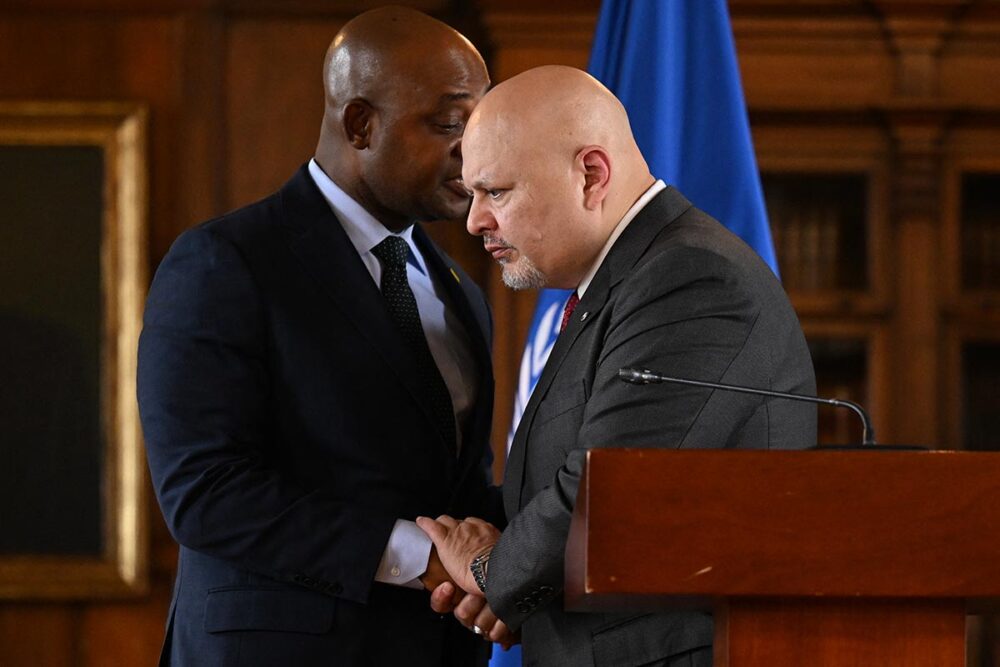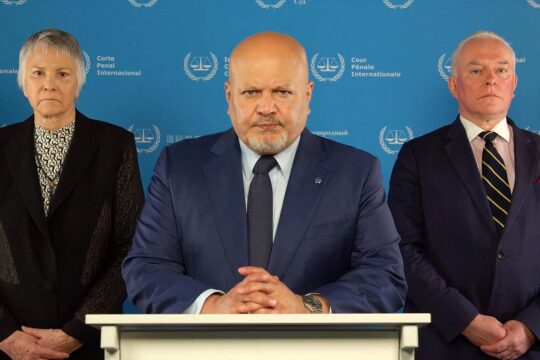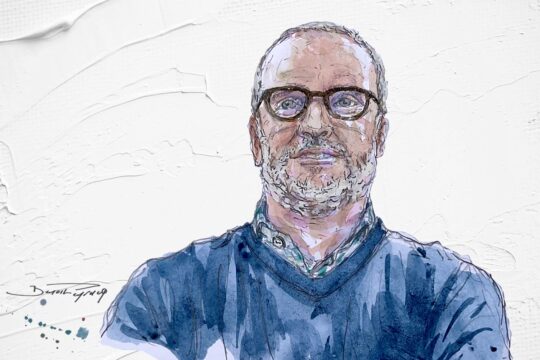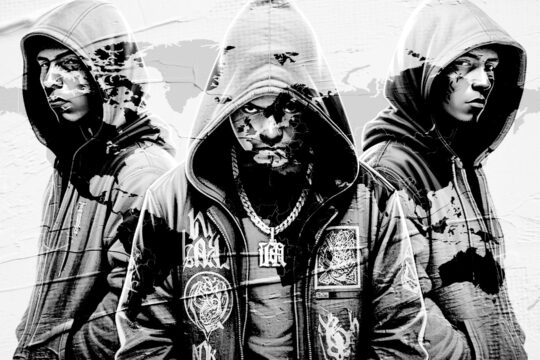When state members of the International Criminal Court (ICC) were looking for a new leader of the office of the prosecutor four years ago, their initial list of candidates failed to inspire and there were multiple rounds of consultations which failed to build consensus around one person. Karim Kahn was only on the second, back up, list. The appraisers provided this rating: “Mr. Khan is a charismatic and articulate communicator who is well aware of his achievements.” They pointed out the drawbacks of having someone previously working as defence counsel before the court and were irritated by “an apparently coordinated write-in campaign by civil society organizations” on his behalf. In February 2021 he was duly elected.
Now, as the court prepares for its annual December budget-setting meeting with its state members, the cracks are showing. The investigation into the Israel-Palestine conflict has positioned the court in the forefront of world politics. The institution faces pressures on multiple fronts, externally and internally. And court supporters wonder if states will step up to protect the institution they negotiated in 1998.
Earlier this month, 20 Palestinians “filed a criminal complaint with the Dutch Office of the Public Prosecutor (Openbaar Ministerie) for impeding and influencing the ICC investigation into the ‘Situation in the State of Palestine’ and the harassment, intimidation, pressuring and defamation of ICC staff, including the ICC prosecutor, in the course of this investigation”. The lawyers base the complaint on journalist investigations into a campaign of intimidation by Israeli intelligence services against Karim Khan’s predecessor Fatou Bensouda. They say – based on that media work – that “the Dutch investigation should focus on (senior) members of the Israeli security apparatus”. According to Danya Chaikel, the International Federation of Human Rights’ representative to the court, “diplomacy alone clearly won’t solve this, and legal action is needed to hold those responsible accountable and to safeguard the integrity of the Court”.
The Dutch did open an investigation back in 2016 and provided protection measures for representative from a Palestinian human rights group who was suffering “ongoing, well-organised and serious attacks, including death threats, interference in communications, intimidation, harassment and defamation” in The Hague. Civil society human rights groups play an important role in providing evidence to and lobbying the ICC.
Israel and US senators target the ICC
Palestine accepted the Court’s jurisdiction and deposited its instrument of accession to the ICC Statute in January 2015. According to The Guardian’s reporting, Israel’s external security service Shin Bet, army intelligence directorate Aman, and the cyber-intelligence division Unit 8200 were involved in operations targeting the ICC from that date.
Pressure on the ICC has also come from Israel’s main backer, the United States. “The 2020 US sanctions targeted senior ICC officials, including former prosecutor Bensouda, disrupting their access to global banking services, resulting in non-US banks refusing to provide services, loss of insurance coverage, and difficulties in contracting with numerous commercial providers,” reminds Chaikel. The US Senate’s Illegitimate Court Counteraction Act of 2023 “imposes sanctions against International Criminal Court (ICC) employees and associates if the ICC investigates or pursues charges against certain individuals,” including “members of the armed forces of U.S. allies or partners”.
12 republican US Senators threatened Khan with sanctions by letter in April, shortly before the ICC prosecutor made public arrest warrants against Israel’s Prime Minister Benjamin Netanyahu and Minister of Defence Yoav Gallant. “If you issue a warrant for the arrest of the Israeli leadership, we will interpret this not only as a threat to Israel’s sovereignty but to the sovereignty of the United States. Our country demonstrated in the American Service-Members' Protection Act the lengths to which we will go to protect that sovereignty,” wrote the senators, including Mitch McConnell, the leader of the Republicans at the US Senate. “Target Israel and we will target you… You have been warned.”
“Regardless of the outcome of the [US presidential] election [on 5 November], whoever is elected has a duty and an obligation to ensure that the rule of law remains robust in the United States” says Carmen Cheung the executive director of Center for Justice and Accountability, “and that we continue to play an important role on the international stage when it comes to international justice. And that means, first and foremost, that we do not continue to attack and demonise the International Criminal Court as we have been”.
A critical time for the court
In May 2024, the ICC Office of the Prosecutor warned anyone attempting to interfere with the court’s processes that such actions could constitute offenses against the administration of justice under Article 70 of the Rome Statute, the ICC’s founding treaty, and must cease immediately. The presidency of the court’s Assembly of States Parties expressed its “concern” that same month over the “recent public statements” related to the Palestine investigation. “The Presidency regrets any attempts to undermine the Court’s independence, integrity and impartiality. Some statements may constitute threats of retaliation against the Court and its officials, in the event the Court exercises its judicial functions as mandated in the Rome Statute,” it said in a press release.
ICC member states have been following their own ‘how-to’ guide to dealing with attacks on their court. In June this year 93 States issued a joint statement expressing their “unwavering support for the Court as an independent and impartial judicial institution”. Another bullet point suggestion was: “Use social media posts from official government accounts to swiftly react to a threat or attack, even before issuing official statements”. Chaikel says “ICC member states need to urgently and actively defend the Court’s independence and very survival, as the ICC is not designed to withstand these threats and attacks alone”.
Virginie Amato of the Coalition for the ICC, an NGO, describes the current situation as a critical time for the court, because even though “all this has happened before” the pressures have been “renewed with greater risks this year”. They are “all aimed at undermining independence and work of the court”.
The court in currently still suffering from “dealing with the aftermath of a serious cyberattack, which has been followed by ongoing cyberthreats [sic] and further attempted attacks,” as outlined in the budget submission which asks for a 10% increase on last year, including over 4 million for cyber security.
Sexual harassment allegations against Karim Khan
Over the last week a new anonymous X handle has been tweeting details of an alleged complaint of sexual harassment against the ICC prosecutor. The allegations were reflected in a British newspaper article in which Karim Khan is "accused of misconduct amid harassment claims involving a female colleague”. The alleged facts apparently surfaced two weeks before Khan announced the arrest warrants against Israeli and Palestinian leaders. The Independent Oversight Mechanism (IOM), which is responsible for investigating allegations of misconduct by the court’s staff, wrote that “the alleged affected individual declined to pursue a formal complaint with the IOM” and “the alleged affected individual refused to explicitly confirm or deny to the IOM the factual basis of what had been reported by the third party to the IOM”. The Daily Mail reported Khan’s denial of any wrongdoing and wrote that he “suggested a deliberate smear campaign, saying he and the court were being subjected 'to a wide range of attacks and threats'”.
“We don’t have enough information to assess if it might be part of a broader strategy to undermine the Court,” says Chaikel. “It's also essential that, generally speaking, all allegations are taken seriously, to uphold the integrity of the ICC and to ensure that any potential complainant is given the necessary support and opportunity to speak out safely,“ she continues. Privately, journalists covering the court discuss the risk of narratives being used to strategically undermine the Court’s credibility and legitimacy.
karim Khan’s initial assessment by states before elected stated that “he demonstrated a clear commitment to a harassment-free workplace, drawing on concrete experience.” In his own application for the job, he emphasised that he expected to be judged on his work and his ability to get his office to function. “Having been involved and led various cases in the ICC and in other national and international courts, I have seen what constitutes a good prosecution, and I have seen how inadequate ones get as far as they do. I have directly interviewed numerous survivors of SGBV [sexual and gender-based violence] and realise how important it is to ensure specialised handling of these witnesses during both the investigative and trial stages. Armed with this experience, I will ensure that the cases my office investigate and present are credible, robust and capable of withstanding the scrutiny they must rightly be subjected to in the crucible of the courtroom.” And he concluded: “I will be committed to an Office of the Prosecutor that will be recognised by, and known for, its competence and integrity.”







